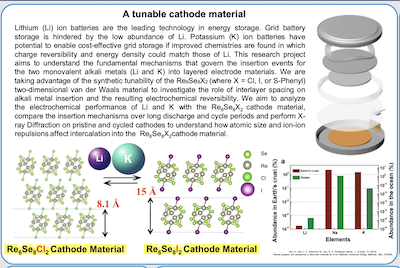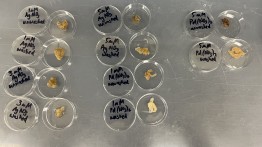Students Wrap Up Unique Summer Experiences
POSTED ON: July 26, 2023
Many students take advantage of the summer months to learn more about their chosen fields of study and test out specific career paths. Seven chemical engineering undergraduates took the time to talk to us about internships and Research Experience for Undergraduates (REU) they undertook during Summer 2023.
Ubaidullah Hassan ChE'25
"I'm doing an REU at the material science and engineering department at Penn State University. My research project is studying infrared absorption of 2D materials. This includes independently using instruments like Fourier transform infrared spectroscopy and code for modeling optical behavior (Yes, better understanding infrared absorption of 2D materials could help further develop thermal sensors.)
"Working closely with a PhD student is helping me develop my research skills and better evaluate if graduate school is right for me. Additionally, I have been getting exposed to the semiconductor industry through visiting company sites and listening to guest speakers."
Nada Shetewi ChE'24
"I am working as an electrochemical engineering intern at a startup that is capturing CO2 from the air and turning it into e-fuels for transportation. A typical workday for me involves running lab tests and optimizing prototype design.
"I am definitely learning a lot on both technical and professional sides. The internship has helped widen my scope on how to approach engineering problems from different perspectives. I have a better grasp of how to work within a team and coordinate all of our tasks together so that we can ultimately reach company targets."
Julian Lam ChE'25
"I am currently at Stony Brook University participating in a Research Experience for Undergraduates (REU) program. My research concerns nanoparticle growth on recycled cotton textiles for a circular, fiber-to-fiber approach to textile waste. We have successfully synthesized silver nanoparticles on these textiles and are beginning to test if they have applications in catalytic dye degradation.
"I am learning (from scratch) everything I need to know about nanoparticles and the associated methods. More importantly, however, I am learning how to use tons of different laboratory techniques/equipment (FTIR, XRD, XRF, SEM, EDS, UV-vis, etc.) and how to analyze the resulting data. Related to this, I am learning how to conduct research, as this is my first research experience; this includes reading papers, formulating experimental procedures, and drawing conclusions from the data."
Sabrina Zhou ChE'24
"At my internship [at a biotech startup], my first priority has been designing medical device applicators for the company's hemostatic gel, specifically for use in laparoscopic surgery or on the battlefield. This would support gel usage across a much larger range of severe bleeding/trauma cases. As a result my prototypes widely vary from one another, so I've been learning to balance several different projects at the same time and plan ahead to use my time efficiently. I've also refined my approach to engineering design—I've realized how important it is to take things one small step at a time while never losing sight of the end goal."
Christopher Ge ChE'25 and Julius Yoh ChE'25: both conducting research at the University of California, Irvine
Christopher: I am working with a certain kind of concrete—high-strength, high-ductility concrete—which requires me to be hands-on with making it. This entails creating the molds, mixing the cementitious materials, casting the concrete, and letting it cure. I also test the concrete through a tension test by operating a machine that slowly pulls each sample upward, typically to the point of fracture. I also check for cracks in my concrete samples through microscopic imaging, recording the widths of cracks and documenting any changes to the crack that happens over time.
Julius: Instead of a lab setting, I am working in the virtual world of computational chemistry. For my project, I am simulating nucleophilic and catalytic interactions with carbon dioxide to determine free energy pathways and reaction rates. Since these are intensive calculations, I am using Irvine’s HPC (High Performance Computing) Cluster. From generating many different types of nucleophiles, my research ascertains specific properties that are ideal for carbon capture and transforming CO2 into desired chemical products.
Christopher: I’m learning about ECC (Engineered Cementitious Composites), the parent iteration of improved concrete. Specifically, I work with high-strength, high-ductility concrete (HSHDC), a refined version of ECC. The overarching theme of our research is decarbonization, so the benefit that HSHDC brings is that it prolongs product service life. This decreases the frequency of End-of-Life processes (reuse, repair, remanufacturing, recycling), which all require resources and cause environmental harm by its association to collection, transport, redistribution, etc. I am also learning about self-healing of concrete, a mechanism that takes after our natural world with seashells. My end goal is to learn how self-healing works with HSHDC.
Julius: I’m learning about the program quantum chemistry package ORCA and the molecular structure program MOLDEN. Learning how to code and operate these programs is very challenging, especially through integrating classes—such as Modern Physics, Organic Chemistry, and Thermodynamics—into these applications. This summer research has also introduced me to computational chemistry, a field I would love to research further at Cooper.

James Aravena ChE'25
"I have a paid REU at Columbia University researching materials to use inside potassium and sodium batteries. Those elements are far more sustainable and abundant than what you need for lithium ion batteries, which are widely in use. The idea is to find how potassium and sodium batteries could be efficiently mass produced.
I work with 15 doctoral students and since I've never conducted research before, I'm learning how a research setting works. A lot of my work involves plotting, analyzing, and presenting data. I've learned a great deal about how to make presentations and how important it is to use very clear and engaging graphics. I'm also realizing that I'd prefer to work in industry looking at the big view of how, for example, a chemical plant should be organized instead of doing specific research. That's made this experience that much more valuable."







